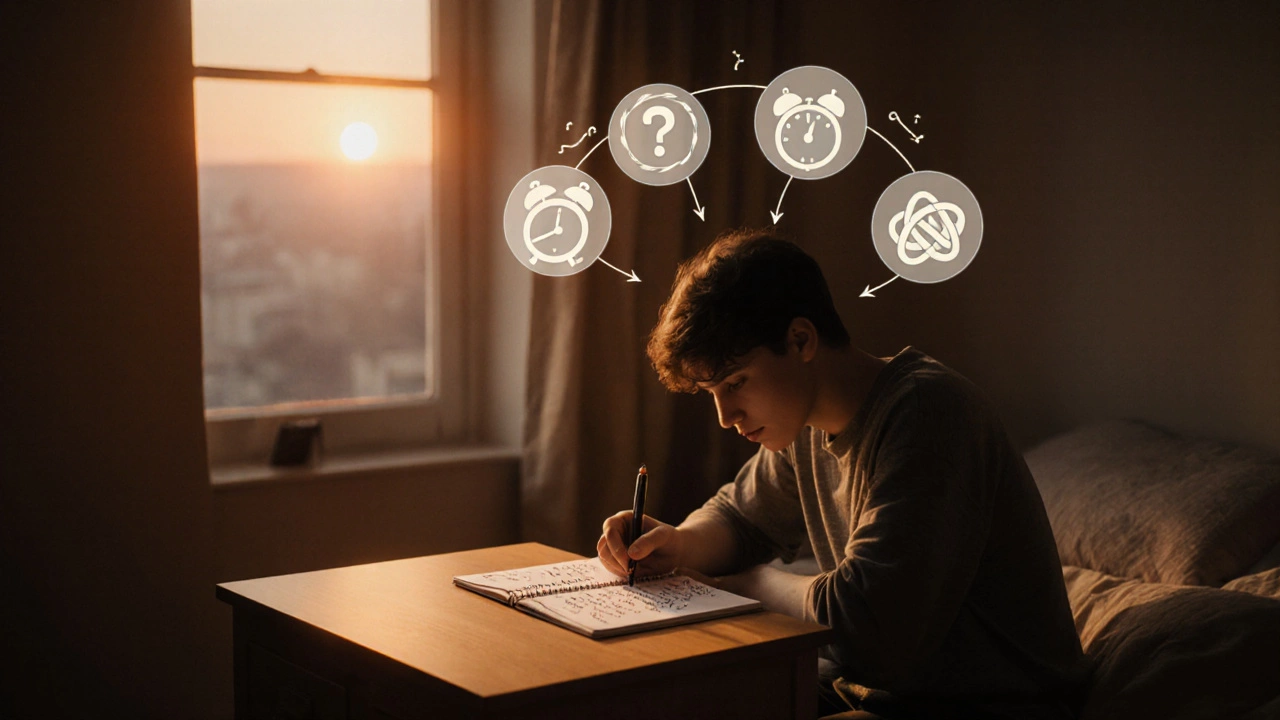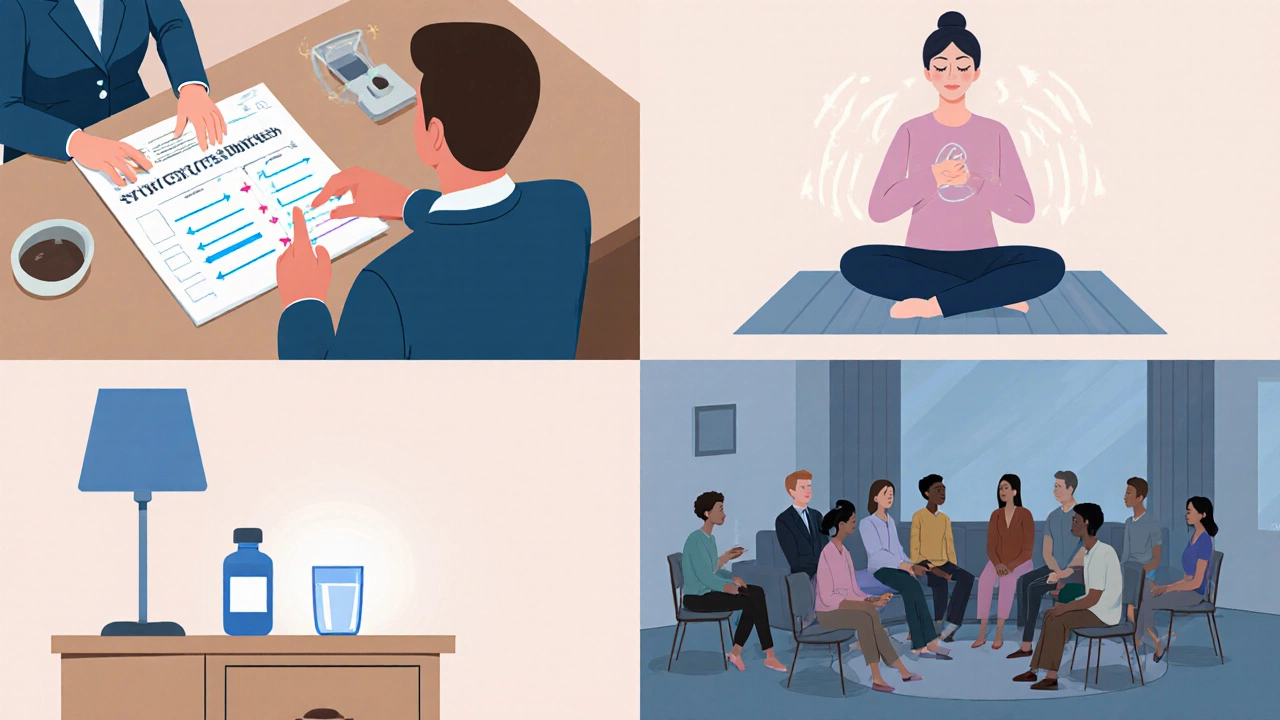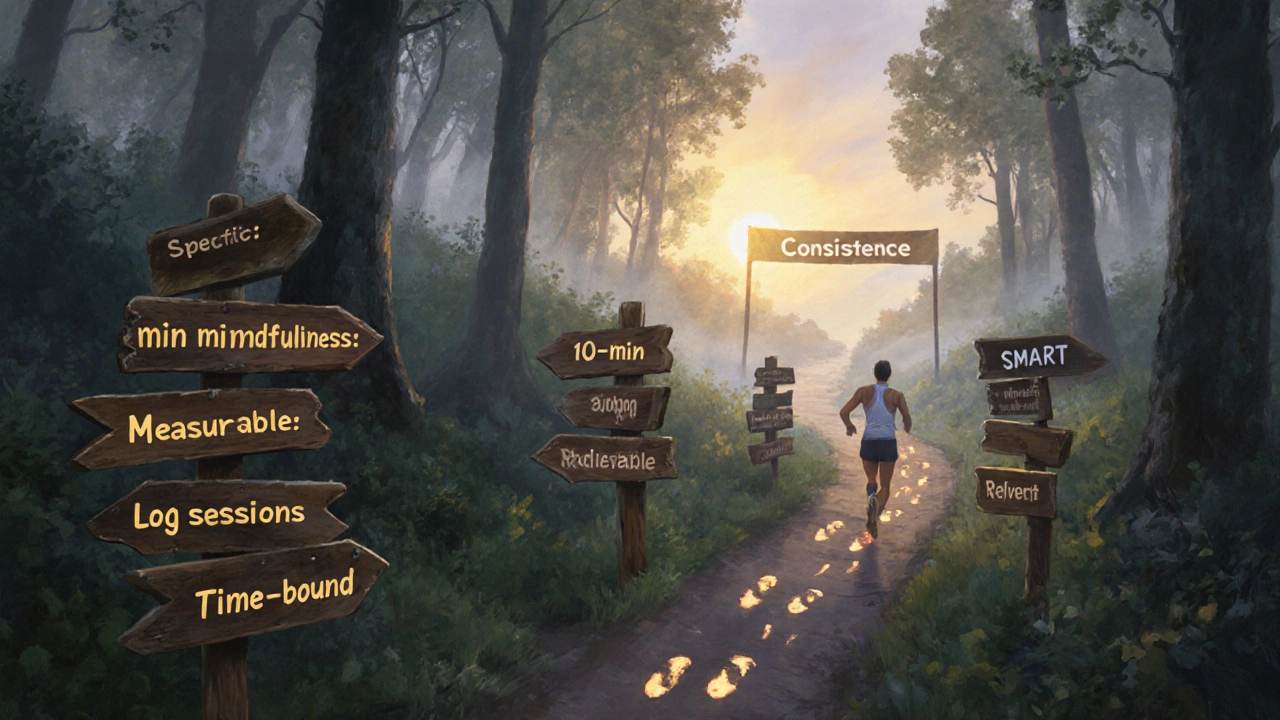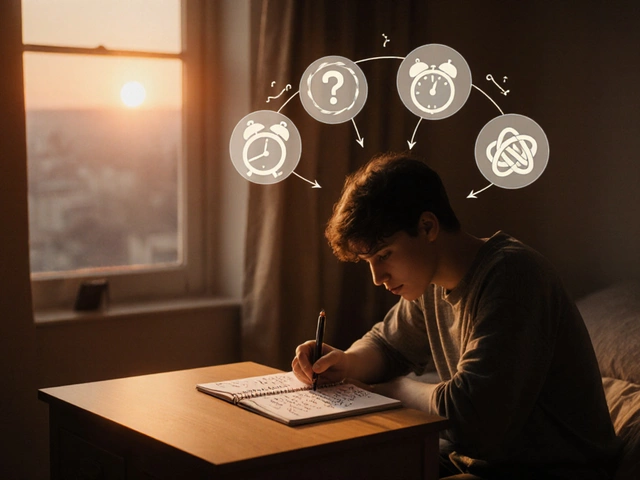- Home
- Mental Health
- How to Overcome Psychological Problems - Practical Steps & Therapies

How to Overcome Psychological Problems - Practical Steps & Therapies
Coping Strategy Matcher
Identify Your Primary Concern
Your Personalized Strategy
Recommended Approach:
Typical Duration:
Key Benefit:
Feeling stuck in a mental loop can be exhausting, but you don’t have to stay there. Below you’ll find a straight‑forward roadmap that turns confusion into clear, doable actions.
First, let’s get on the same page about what we’re tackling.
Psychological problems are patterns of thought, emotion, or behavior that cause distress or impair everyday functioning. They range from occasional anxiety spikes to chronic mood disorders, and each type often has its own triggers and warning signs.
If you’re battling psychological problems, these steps can help.
1. Identify the Specific Issue
Pinpointing the exact problem saves you from trying generic fixes that miss the mark. Ask yourself:
- What thoughts keep looping?
- Which situations amplify the discomfort?
- How does it affect work, relationships, or sleep?
Writing these observations in a simple notebook, or a phone note, creates a baseline you can track over weeks.
2. Choose a Proven Coping Strategy
Once you know what you’re facing, match it with a technique that has solid evidence. Below are four go‑to approaches that cover most common issues.
Cognitive‑behavioral therapy (often shortened to CBT) focuses on identifying distorted thoughts and replacing them with realistic alternatives. It’s the backbone of many self‑help programs and is backed by dozens of randomized trials for anxiety, depression, and OCD.
Mindfulness teaches you to notice sensations, thoughts, and feelings without judging them. Research from Harvard Medical School shows an eight‑week mindfulness‑based stress reduction (MBSR) course can lower cortisol levels by up to 30%.
Medication isn’t a silver bullet, but for moderate‑to‑severe mood disorders, pharma‑supported treatments (like SSRIs for depression) can stabilize chemistry long enough for therapy to take root. Always discuss benefits and side‑effects with a qualified prescriber.
Support groups provide peer‑to‑peer validation. Whether you join a local meetup or an online forum, hearing others vocalize the same struggle reduces isolation by about 40% according to a 2023 APA survey.
3. Build a Personal Action Plan
Turn the chosen strategy into a daily habit. Use the SMART framework (Specific, Measurable, Achievable, Relevant, Time‑bound) to write it down.
- S: "Practice 10‑minute guided mindfulness on weekdays at 7 am."
- M: Log each session in a habit‑tracking app.
- A: Keep the duration short initially; scale up as it feels natural.
- R: Choose mindfulness because it directly targets racing thoughts.
- T: Review progress every Sunday for four weeks.
Consistency beats intensity; a 5‑minute nightly CBT worksheet often yields better outcomes than a sporadic hour‑long session.

4. Seek Professional Guidance When Needed
Self‑help is powerful, but some situations demand expert input.
Psychiatrist is a medical doctor specialized in diagnosing mental disorders and prescribing medication. A single evaluation can rule out underlying conditions like thyroid imbalance that mimic anxiety.
Therapist (including licensed clinical social workers, counselors, and psychologists) provides talk‑based interventions such as CBT or dialectical behavior therapy (DBT). Most insurance plans cover 12-20 sessions per year.
If you notice any of the following red flags, schedule an appointment ASAP:
- Thoughts of self‑harm or suicide.
- Sudden loss of appetite or extreme weight changes.
- Persistent insomnia lasting more than two weeks.
5. Leverage Self‑Help Resources Wisely
Books, apps, and podcasts can reinforce what you learn in therapy.
Self‑help books such as "The Feeling Good Handbook" by David D. Burns condense CBT techniques into bite‑size exercises you can do at home.
Popular apps like Headspace or Calm offer guided meditation tracks that align with the mindfulness approach. Choose one with a free tier to test it before committing to a subscription.
6. Track Progress and Adjust
Every two weeks, revisit your habit log and journal entries. Ask:
- Are my thoughts less intrusive?
- Do I feel more in control of my emotions?
- Is my sleep quality improving?
If you’re not seeing measurable gains, consider swapping a single element - maybe add a support‑group meeting or ask your therapist to introduce exposure techniques.

7. Understand Common Psychological Challenges
Below is a quick snapshot of three frequently encountered problems and the best‑fit interventions.
| Issue | Primary Approach | Typical Duration | Key Benefit |
|---|---|---|---|
| Generalized Anxiety | Cognitive‑behavioral therapy | 12-20 weeks | Reduces catastrophic thinking |
| Recurrent Stress | Mindfulness | Ongoing, 10 min daily | Lowers cortisol, improves focus |
| Major Depression | Medication + Therapist | 6-12 months (adjustable) | Stabilizes mood, enables therapy work |
| Social Isolation | Support groups | Weekly 1-2 h sessions | Boosts belonging, shares coping tips |
8. Common Pitfalls and How to Avoid Them
Even with a solid plan, it’s easy to slip back into old habits. Watch out for these traps:
- All‑or‑nothing thinking: Skipping one day feels like failure. Treat missed days as data, not defeat.
- Relying solely on one method: Pair mindfulness with CBT worksheets for synergy.
- Ignoring physical health: Exercise, nutrition, and sleep dramatically influence mental resilience.
- Self‑diagnosing from the internet: Use reputable sources, then verify with a professional.
Next Steps
Pick the first two items from the action plan and commit to them for one week. After that, evaluate what felt useful and what didn’t. Remember, solving psychological problems isn’t a sprint; it’s a marathon paced by small, consistent wins.
How long does it take to see improvement with CBT?
Most people notice reduced anxiety or negative thoughts within 6-8 weeks of weekly CBT sessions, though full symptom remission can take 3-6 months depending on severity.
Is medication necessary for all depression cases?
No. Mild to moderate depression often responds well to psychotherapy, lifestyle changes, and self‑help tools. Medication is usually reserved for moderate‑to‑severe cases or when therapy alone isn’t enough.
Can I combine mindfulness with medication?
Absolutely. Mindfulness can lessen side‑effects like restlessness and improve adherence. Always discuss any new practice with your prescribing doctor.
What if I can’t afford a therapist?
Look for community mental‑health clinics, sliding‑scale counseling, or online platforms offering free initial sessions. Many universities also run training clinics with supervised graduate students at low cost.
How do I know which support group is right for me?
Start by identifying the primary issue (e.g., anxiety, grief, addiction). Search for groups that focus on that theme, read member reviews, and attend a trial meeting to gauge fit.

Arnav Singh
I am a health expert with a focus on medicine-related topics in India. My work involves researching and writing articles that aim to inform and educate readers about health and wellness practices. I enjoy exploring the intersections of traditional and modern medicine and how they impact healthcare in the Indian context. Writing for various health magazines and platforms allows me to share my insights with a wider audience.
Popular Articles
About
Medical Resource Center India is a comprehensive online platform dedicated to providing reliable health information and medical resources in India. Explore a wide range of articles, tips, and advice on medicine, healthcare services, and wellness. Stay informed about the latest developments in Indian medicine and access valuable insights into maintaining a healthy lifestyle. Discover expert guidance and health solutions tailored for every Indian citizen. Your go-to destination for authoritative medical knowledge in India.






